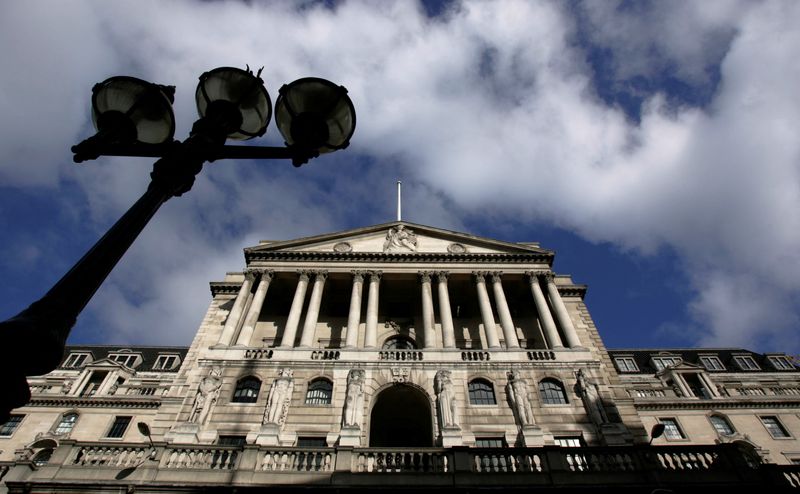By Swathi Nair
BENGALURU (Reuters) - The Bank of England will raise interest rates faster than previously thought to tame surging inflation, according to economists polled by Reuters who significantly upgraded their forecasts for consumer price rises.
A near 30-year high inflation rate in December pressured Britain's central bank to raise rates for a second meeting in a row earlier this month, taking Bank Rate to 0.50%.
But nearly half of the Monetary Policy Committee (MPC) members voted for a hike to 0.75%, making further tightening next month more likely.
Nearly two-thirds of respondents in the Feb. 7-11 poll, or 25 of 40, expected a 25 basis points increase in Bank Rate to 0.75% at the conclusion of the next MPC meeting on March 17. That would mark the first time the Bank has raised rates at three meetings in a row since 1997.
A slim majority, 21 of 41, forecast a further increase to 1.00% next quarter. That is well behind financial markets, which are pricing in the bank to make a cumulative 75 basis points of increases at its March and May meetings.
In a poll taken last month, only one further increase was expected this year - in the third quarter - showing how quickly rate expectations are changing.
"A combination of higher inflation, a resilient labour market, and better-than-expected Omicron data warrants a continuation of the hiking cycle that began in December," said Michal Stelmach, senior economist at KPMG.
"We expect the MPC to follow through with rate hikes in March and May, with a potential pause afterwards to allow the new policy direction to get embedded".
Also facing high inflation, now at the highest in four decades at 7.5%, the U.S. Federal Reserve is expected to tighten at its March policy meeting.
Persistent global supply chain issues and rising energy prices have pushed this year's median inflation forecast up for the ninth consecutive survey.
Inflation was pegged at 5.7% this quarter on average and seen peaking at 6.6% next quarter, up 0.5 and 1.1 percentage points respectively from January, around treble the BoE's 2.0% target.
Inflation was then expected to ease in the third and fourth quarters to 5.9% and 4.5%.
"Inflation will peak at slightly below 7% in April, when the effects of the energy price hike are fully captured in the data. The second half of the year should see supply-side inflationary pressures easing," said Stefan Koopman, senior macro strategist at Rabobank.
More than 80% of respondents to an extra question, 15 of 18, said it was more likely the BoE increases rates more than they expect rather than less.
Britain's economy shrank 0.2% in December, less than expected, as the Omicron coronavirus variant swept Europe and the loss of momentum is likely to have stretched through this quarter.
The economy was predicted to expand 0.4% this quarter and 0.9% next. Growth was then seen slowing to 0.6% in both the third and fourth quarters.
Across 2022 annual growth was put at 4.3% and for 2023 it was 2.1%, down from 4.5% and 2.2% predicted a month ago.
Amidst calls from BoE officials for wage restraint 85% of respondents, 17 of 20, did not see pay rises keeping up with inflation over the next 12 months.
"The UK already has falling real pay, weakening nominal pay growth and a clear risk of stagnating economic growth, so any notion of an impending wage-price spiral seems overdone," said Koopman.
(For other stories from the Reuters global economic poll:)
